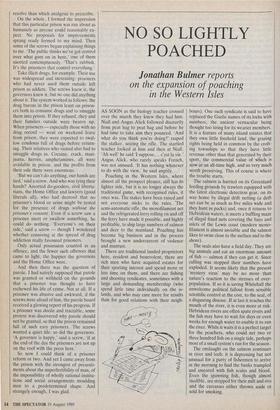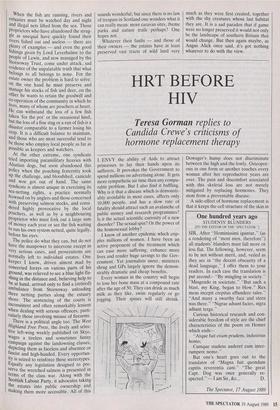NO SO LIGHTLY POACHED
Jonathan Bulmer reports
on the expansion of poaching in the Western Isles
AS SOON as the biology teacher crossed over the march they knew they had him. Niall and Angus Alick followed discreetly from peat hag to peat hag and before he had time to take aim they pounced. 'And what do you think you're doing?' rasped the stalker, seizing the rifle. The startled teacher looked at him and then at Niall. `Ah well' he said 'I suppose... c'est la vie.' Angus Alick, who rarely speaks French, was not amused. 'It has nothing whatever to do with the view,' he said angrily.
Poaching in the Western Isles, where almost all the prospect pleases, still has its lighter side, but it is no longer always the traditional game, with recognised rules, it once was. The stakes have been raised and not everyone sticks to the rules. The semi-automatic rifle, the monofilament net and the refrigerated lorry rolling on and off the ferry have made it possible, and highly profitable, to ship large numbers of salmon and deer to the mainland. Poaching has become big business and in the process brought a new undercurrent of violence and mistrust.
There are traditional landed proprietors here, resident and benevolent, there are rich men who have acquired estates for their sporting interest and spend more or less time on them, and there are fishing and shooting syndicates, sometimes with a large and demanding membership (who spend little time individually on the is- lands, and who may care more for results than for good relations with their neigh-
bours). One such syndicate is said to have replaced the Gaelic names of its lochs with numbers, the ancient vernacular being thought too tiring for its wearier members. It is a feature of many island estates that they own little freehold land, the grazing rights being held in common by the croft- ing townships so that they have little revenue other than that generated by their sport, the commercial value of which is now at an all-time high, and so very much worth preserving. This of course is where the trouble starts; The salmon is harried on its Greenland feeding grounds by trawlers equipped with the latest electronic detection gear, on its way home by illegal drift netting (a drift net can be as much as five miles wide and they hunt in packs) and, once it returns to Hebridean waters, it meets a baffling maze of illegal fixed nets covering the bays and inlets of the Lewis coast (modern mono- filament is almost invisible and the salmon likes to swim close to the surface and to the shore).
The seals also have a field day. They are big animals and eat an enormous amount of fish — salmon if they can get it. Since culling was stopped their numbers have exploded. It seems likely that the present `mystery virus' may be no more than nature's reaction to the stresses of over- population. If so it is saving Whitehall the unwelcome political fallout from sensible scientific control at the cost, to the seal, of a disgusting disease. If at last it reaches the mouth of the river, it is even more at risk. Hebridean rivers are often spate rivers and the fish may have to wait for days or even weeks for enough water to enable it to run the river. While it waits it is a perfect target for the poachers, who could net two or three hundred fish on a single tide, perhaps most of a small system's run for the season.
The onslaught on the salmon continues in river and loch: it is depressing but not unusual for a party of fishermen to arrive in the morning to find the banks trampled and smeared with fish scales and blood. Even the spawning fish, though almost inedible, are stripped for their milt and ova and the carcasses either thrown aside or sold for smoking. When the fish are running, rivers and estuaries must be watched day and night and illegal nets lifted from the sea. Those proprietors who have abandoned the strug- gle as unequal have quickly found their rivers fished out and useless — there are plenty of examples — and even the good fishings given by Lord Leverhulme to the People of Lewis, and now managed by the Stornoway Trust, come under attack, sad evidence of the unpalatable truth that what belongs to all belongs to none. For the estate owner the problem is hard to solve: on the one hand he must preserve and manage his stocks of fish and deer, on the other he wants to retain the goodwill and co-operation of the community in which he lives, many of whom are poachers at heart. He can withstand the loss of a few fish taken 'for the pot' or the occasional hind, but the loss of a fine stag or a run of fish is a disaster comparable to a farmer losing his crop. It is a difficult balance to maintain, and those who are most successful tend to be those who employ local people as far as possible as keepers and watchers.
.At the other extreme, one syndicate tried importing paramilitary heavies with Alsatian dogs, but soon abandoned this policy when the poaching fraternity took lip the challenge, and bloodshed, canicide and woe got out of hand. The same syndicate is almost unique in exercising its sea-netting rights, a practice normally frowned on by anglers and those concerned with preserving salmon stocks, and consi- dered highly provocative by the local Poachers, as well as by a neighbouring Proprietor who must fork out a large sum of money each year or see the fish waiting to run his own system netted, quite legally, before his eyes.
The police do what they can, but do not have the manpower to intervene except in very serious cases, and prosecutions are normally left to individual estates. One keeper I know, driven almost mad by Concerted forays on various parts of his ground, was relieved to see a blue light fla- shing in the distance and, believing help to be at hand, arrived only to find a (retired) ambulance from Stornoway unloading three netting parties along the estuary Shore. The sentencing of the courts is inconsistent and often remarkably lenient When dealing with serious offences, parti- cularly those involving misuse of firearms. There is a political angle too. The West Highland Free Press, the lively and selec- tive left-wing weekly published on Skye, Wages a tireless and sometimes funny Campaign against the landowning classes, depicting them as faceless and absentee or fascist and high-handed. Every opportun- ity is seized to reinforce these stereotypes. Equally any legislation designed to pre- serve the wretched salmon is presented in terms of the class war. Along with the Scottish Labour Party, it advocates taking the estates into public ownership and making them more accessible. All of this
sounds wonderful; but since there is no law of trespass in Scotland one wonders what it can really mean: more caravan sites, theme parks and nature trails perhaps? One hopes not. Whatever their faults — and those of their owners — the estates have at least preserved vast tracts of wild land very much as they were first created, together with the shy creatures whose last habitat they are. It is a sad paradox that if game were no longer preserved it would not only be the landscape of southern Britain that would change. But then again maybe, as Angus Alick Once said, it's got nothing whatever to do with the view.



















































 Previous page
Previous page